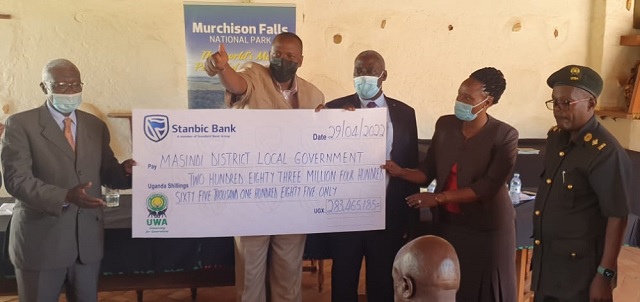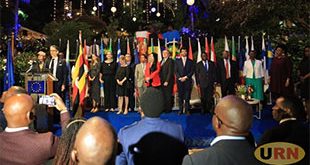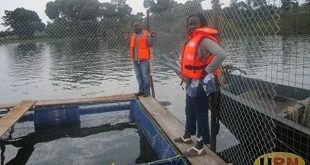
Masindi, Uganda | Ronald Musoke | On April 29, the Uganda Wildlife Authority (UWA) handed over Shs2.9bn to the heads of local government from the five districts that neighbor Murchison Falls Protected Area. This conservation zone found in northwestern Uganda comprises Murchison Falls National Park, Karuma Wildlife Reserve and Bugungu Wildlife Reserve.
The ceremony which took place at Masindi Hotel was presided over by Col. Tom Butime, the Minister of Tourism, Wildlife and Antiquities who handed over the cheques to the leaders of Nwoya, Buliisa, Oyam, Masindi, Kiryandongo and Pakwach districts.
Buliisa district received the highest amount of Shs736 million, followed by Kiryandongo (Shs680 million), Nwoya (Shs672 million), Pakwach (Shs347 million), Masindi (Shs283 million) and Oyam (Shs208 million).
According to the Uganda Wildlife Act 2019, UWA is mandated to give back 20% of its annual park gate collections as a conditional grant to the communities neighboring the national parks under the revenue sharing scheme.
The revenue sharing format is meant to strengthen partnerships between local communities, local governments and the management of wildlife areas leading to sustainable management of wildlife resources in protected areas. Funds given to districts under the revenue sharing scheme go to community income generating projects identified by communities.
Butime said the government recognizes the contribution of the local communities in wildlife protected area management. He noted that local communities that live next to these resources do not only guard them but also suffer the impacts of conserving wildlife in their areas. It is therefore imperative that the communities share the benefits that accrue from conservation work, he said.
“It is for this reason that government gives back a portion of the revenues from the park to appreciate the role of the community in the protection of the wildlife resources,” he said.
Revenue sharing is also aimed at partially demonstrating the economic importance of the existence of the wildlife protected areas that communities live next to. Butiime cautioned leaders against diverting revenue sharing funds to other activities or delaying the release of the funds which impacts on service delivery.
“I want to instruct Chief Administrative Officers to ensure that the money disbursed today reach the targeted sub counties and communities in time. The government will not tolerate any diversion of the funds to projects which are not listed on the allocation schedule or any unnecessary delays in release of these funds to the target community or projects. The government will also not tolerate the use of project money on administrative costs of the districts,” said Butime.
Sam Mwandha, the executive director of UWA said that communities are key stakeholders in wildlife conservation and their wellbeing is a matter of priority to the authority.
“We understand that if communities don’t see the benefits of wildlife conservation in their areas, we cannot succeed in our work. Therefore improving their livelihoods is not an option, we want to conserve with them and share benefits with them,” he said.
Speaking on behalf of the district leaders, Cosmas Byaruhanga who is the Masindi District LC V Chairperson hailed the good relationship between UWA and the communities and pledged the commitment of the leaders towards promoting conservation in their respective districts.
Byaruhanga said UWA’s commitment to release revenue sharing funds even when the institution’s revenues are still low due to a drop in visitor numbers to protected areas is “commendable.” He said the leaders will ensure that the money goes directly to projects that improve the likelihoods of communities.
It was the first time UWA was sharing the revenues with local communities since 2019. COVID-19 affected tourism revenue streams in 2020 and 2021. Although tourism activities were partially permitted, the revenues dipped over the two years. In 2019, UWA shared out Shs4,189,834,069 meaning there was a 30% drop in the amount of money shared with the communities.
 The Independent Uganda: You get the Truth we Pay the Price
The Independent Uganda: You get the Truth we Pay the Price



